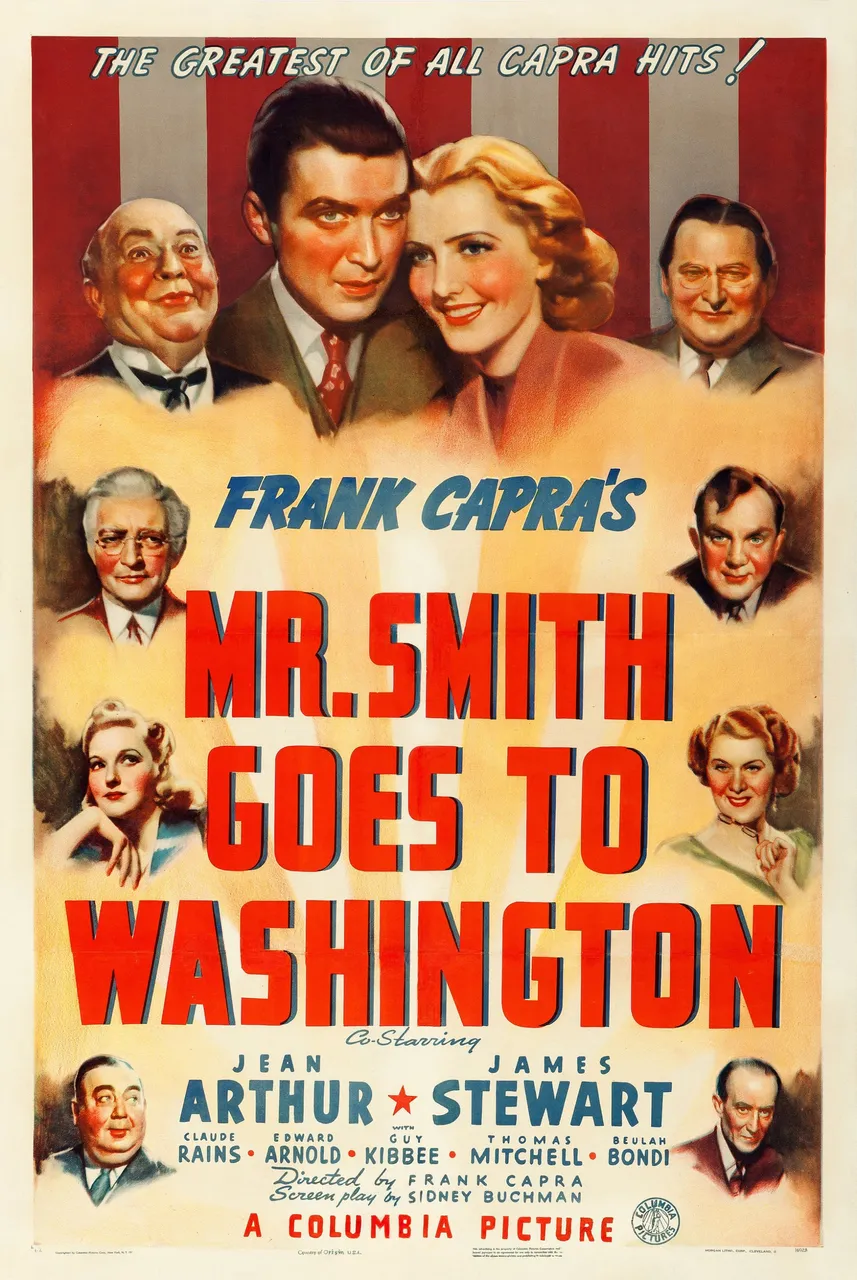
Mr. Smith Goes to Washington is a 1939 American political comedy-drama film directed by Frank Capra, starring Jean Arthur and James Stewart, and featuring Claude Rains and Edward Arnold.
The film is about a newly appointed United States Senator who fights against a corrupt political system. The film was written by Sidney Buchman, based on Lewis R. Foster's unpublished story "The Gentleman from Montana". The film was nominated for 11 Academy Awards and is considered a classic of American cinema. Despite being made over 80 years ago, the film's themes of political corruption and the struggle for idealism still resonate with audiences today.
Plot
Mr. Smith Goes to Washington is a 1939 political comedy-drama film directed by Frank Capra, starring James Stewart as Jefferson Smith, a naive and idealistic young man who becomes a United States Senator. The plot revolves around Smith's journey to expose the corruption of the political system in Washington, D.C. The film's main plot points include:
Jefferson Smith's appointment: Smith is appointed as a United States Senator, representing the state of Montana. He is an inexperienced idealist who is eager to make a difference in the government.
Meeting with corruption: Once in Washington, Smith uncovers a corrupt political machine run by Senator Joseph Paine (played by Claude Rains). He decides to take action against the corruption.
Investigating the machine: Smith starts investigating the political machine, which involves a complex network of corruption and influence peddling. He uncovers a series of scandals and schemes that shock him.
Exposing the truth: As Smith delves deeper into the corruption, he exposes the machine's involvement in various scandals, including the sale of a naval shipment to a foreign power.
Climactic speech: In a climactic scene, Smith delivers a powerful speech on the floor of the Senate, accusing the corrupt politicians of selling out the country. This speech goes viral and captivates the public.
Facing the consequences: As a result of his investigations, Smith faces retaliation from corrupt politicians, who try to discredit him and undermine his credibility.
Defending his actions: Smith refuses to back down and continues to fight against corruption, defending his actions and beliefs even when faced with personal consequences.
Throughout the film, Smith's idealism and determination to make a difference in the government serve as a powerful reminder of the importance of integrity and the will of the people. The film's message about the dangers of corruption and the need for vigilance in government remains relevant today.
Trailer
Cast
- Jean Arthur as Clarissa Saunders
- James Stewart as Jefferson Smith
- Claude Rains as Senator Joseph Paine
- Edward Arnold as Jim Taylor
- Guy Kibbee as Governor Hubert "Happy" Hopper
- Thomas Mitchell as "Diz" Moore
- Eugene Pallette as Chick McGann
- Beulah Bondi as Ma Smith
- H.B. Warner as Senate Majority Leader
- Harry Carey as President of the Senate
- Astrid Allwyn as Susan Paine
- Ruth Donnelly as Emma Hopper
- Grant Mitchell as Senator MacPherson, Privileges and Elections Committee
- Porter Hall as Senator Monroe (objecting to frivolity)
- Pierre Watkin as Senate Minority Leader
- Charles Lane as Nosey, Newsman
- William Demarest as Bill Griffith (At Station)
- Dick Elliott as Carl Cook (At Station)
- Billy Watson as Peter Hopper
- Delmar Watson as Jimmie Hopper
- Johnny Russell as Otis Hopper
- Harry Watson as Hopper Boy
- Garry Watson as Hopper Boy
- Larry Simms as Hopper Boy (as Baby Dumpling)
- H.V. Kaltenborn as Himself (voice) (uncredited)
Director: Frank Capra
Writer: Lewis R. Foster, Sidney Buchman
Box Office Gross: $144,738
Distributor: Columbia Pictures, Columbia TriStar Home Video, Columbia Tristar
Release Date (Theaters): Oct 19, 1939
Release Date (Streaming): Apr 16, 2012
Theme
The film Mr. Smith Goes to Washington explores themes of idealism, political corruption, and the power of the individual in a democracy. It portrays the struggle of an ordinary man against a corrupt political system, emphasizing the importance of integrity and the fight for justice.
Reception
The film was well-received upon its release and has since been regarded as a classic. It was nominated for 11 Academy Awards and continues to be praised for its powerful storytelling and timeless themes.
Production Challenges
During the production of the film, director Frank Capra faced challenges in portraying the political landscape and maintaining the balance between drama and comedy. The film also encountered some controversy due to its depiction of political corruption.
Settings
The film is primarily set in Washington, D.C., and it captures the grandeur of the nation's capital, including iconic landmarks such as the Capitol Building and the Senate chamber.
Visual Styles and Techniques
Mr. Smith Goes to Washington is known for its use of dynamic camera work and striking visual compositions. Director Frank Capra employed various techniques to convey the emotional intensity of the story, including dramatic lighting and powerful close-up shots.
Trivia and Fun Facts
- James Stewart's performance as Jefferson Smith is one of the most iconic roles of his career.
- The film's depiction of the Senate and political machinations led to some controversy, with certain groups criticizing its portrayal of American politics.
General:
)